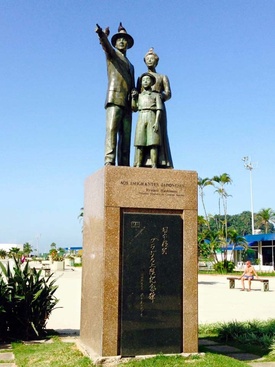In 1908, Japanese people began to migrate en masse to Brazil. Ten years later, in 1918, people from Amami, Kagoshima Prefecture also began to migrate to Brazil. 2018 marks the 100th anniversary of this. On February 25, 2018, at the Amami City Learning and Welfare Festival held at the Amami Cultural Center, I held an "Amami Brazil Emigrants Discussion Session" to introduce people who migrated from Amami to Brazil, and displayed video interviews and panels of people from Amami who are now living in Brazil.
While some visitors commented that they felt close to Brazilian immigrants, such as "I have relatives who went to Brazil" or "I have neighbors who returned from Brazil," one visitor's comment caught my attention: "There were also abandoned Brazilians in Amami."
Were the Brazilian immigrants "abandoned people"? In this year marking the 100th anniversary of the Amami immigration to Brazil, I wanted to reconsider what the Brazilian immigrants were from the Amami perspective.
* * * * *
Atsushi Tsuneshige (76) from Naze, Amami City, moved to Brazil with his family when he was 15 years old. Atsushi's older brother was planning to move to Brazil as part of his extended family, but his father said, "If you go to Brazil, I'll quit my job and go with you," so he quit his job and moved to Brazil with his family. Atsushi had just entered Oshima High School (Naze, Amami City, commonly known as "Otaka") at the time, but he had to drop out of Otaka in the first semester. That's why he said, "I only felt regret for the first 10 years after coming to Brazil." At that time, he felt, "There's a valley in the field, and I've fallen into it. There's a sheet covering me, and my classmates are looking at me through a hole in the sheet. Even if they say, 'Hey! Shige, are you okay? Climb up!', I can't climb up because of the disparity."

After moving to Brazil, he returned to Amami twice. The first time was when he was 49 years old. His classmates held a class reunion for him, saying, "You're the only one from your class who has gone abroad, so please let us know about the news abroad." At the reunion, Atsushi felt a huge disparity in the "standard of living" between him and his classmates. He had just gotten married, had no assets and was struggling to make ends meet, but from his perspective, his classmates were well-educated, had good jobs and were living stable lives. It was frustrating.
Returning to Brazil, he worked hard at business, saying, "I will never again think of Japan." When his business was on track and his life was stable, he returned to Amami once again. He was 61 years old. Another class reunion was held, but at 11pm, he saw his classmates hurrying home, saying, "I have to work tomorrow," and felt sad, thinking, "In Brazil, it's still early evening, 11 or 12 o'clock." He had already become comfortable living in Brazil.
"(Moving to Brazil) is not a bad thing for everyone. I think it depends on the time and the situation, and it's hard to put it in one word," says Atsushi.
Whenever we talk about Amami, the topic of "Otaka" always comes up. For Atsushi, the three months he spent in Otaka are his most vivid memory of Amami. In June 2017, I gave a lecture on Amami immigrants to Brazil at Rikkyo University in Tokyo. Many people connected to Amami came to listen to the lecture. Later, I received a postcard from one of the attendees, with his impressions written on it. It said, "This makes me think of Atsushi, who was my senior." This year marks 60 years since Atsushi went to Brazil. Even now, there are people who remember "Atsushi of Otaka."
*This article is reprinted from the Nankai Nichinichi Shimbun (April 19, 2018).
© 2018 Kato Saori












